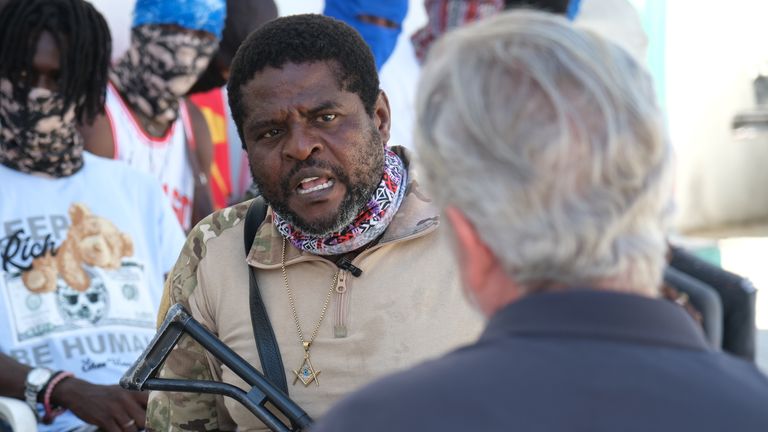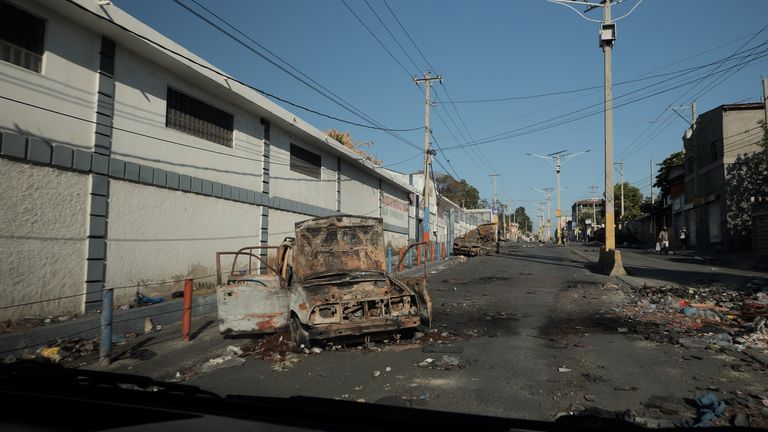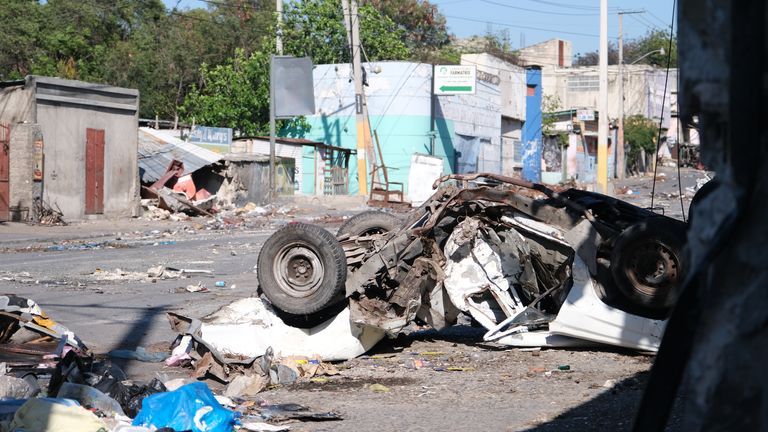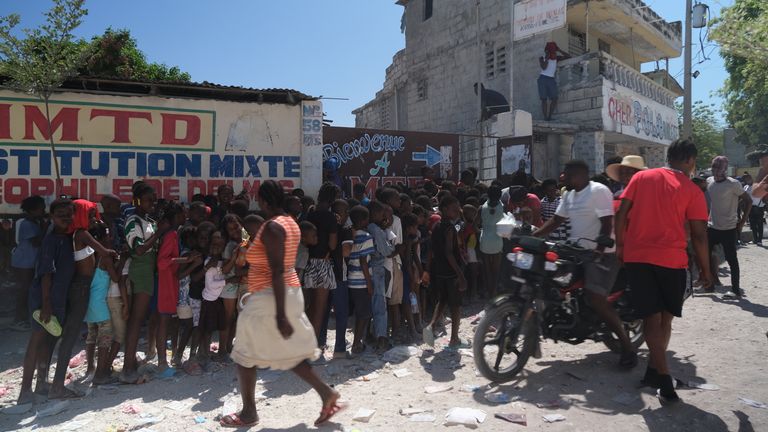What is happening in Haiti! Haiti gang boss will take part in talks if invited
 A leader of Haiti's dominant gang, who controls a network of gangs crippling the capital city, says he might join peace talks if invited. However, he warns that the current calm is temporary and expects more violence soon.
A leader of Haiti's dominant gang, who controls a network of gangs crippling the capital city, says he might join peace talks if invited. However, he warns that the current calm is temporary and expects more violence soon.
Despite his talk of strategy, Barbecue insists there's no real peace. He views the current lull in violence as a tactical one, a chance to regroup and plan for further attacks. He ominously predicts the situation will escalate in the coming days.
Haiti's political parties, with help from the Caribbean economic union (CARICOM), are working on a temporary governing body to take over after the Prime Minister steps down. However, Barbecue criticizes this effort. While he respects CARICOM, he dismisses the plan as a sham that benefits corrupt politicians and wealthy elites, not the Haitian people. He insists that true progress requires including him and his gang alliance in the peace talks. Barbecue claims they are open to dialogue and laying down arms, but only if international efforts involve them as equals in shaping the country's future, not dictating solutions. He portrays his gang as liberators, not violent aggressors, using their weapons as a necessary tool for change.
What is happening in Haiti?
 Trapped in a cycle of violence and desperation.
Trapped in a cycle of violence and desperation.
The use of "vigilantes" suggests a chaotic and dangerous situation.
Defending their neighborhood "tooth and nail" implies a desperate struggle for survival, often associated with impoverished communities.
Chaos reigns in Haiti. Weeks of relentless violence have left entire neighborhoods in ashes. Tens of thousands have fled their homes, escaping the constant threat of murder, rape, and gunfights. Gangs now rule over most of Port-au-Prince, effectively shutting down any semblance of normal life.
Our journey to meet Barbecue unfolded in a warzone-like atmosphere. The once-important highway, now under his gang's control, lay deserted, scarred with burned patches of asphalt and the twisted remains of vehicles. We were warned of watchful snipers and instructed to drive cautiously, following our guide's every lead. After leaving the desolate highway, we navigated a labyrinth of narrow backstreets until we reached a designated meeting point, where a group of menacing gunmen clad in balaclavas awaited us. The once-busy highway is now a deserted "battlefield," barricaded and marked by destruction, highlighting the dramatic escalation of violence.
The once-busy highway is now a deserted "battlefield," barricaded and marked by destruction, highlighting the dramatic escalation of violence.
Barbecue previously discouraged filming his armed guards, but now actively wants them showcased. Additionally, he carries two weapons himself. This deliberate display of firepower serves as a clear message of intimidation and his commitment to the conflict.
The reporter concludes that Barbecue's actions signify a full-blown war. He wants the authorities and his enemies to be under no illusions about the seriousness of the situation.
Barbecue, though not the sole source of Haiti's capital's violence, undeniably plays a central role. His armed men are ever-present.
Barbecue portrays himself as a champion of the people, fiercely criticizing corrupt politicians and wealthy elites. He rejects all attempts to establish a transitional governing body, arguing these efforts are led by self-serving politicians who lack genuine concern for Haiti. He claims to be open to dialogue, but believes the current political class is unwilling. He views their exclusion of armed groups like his as a tactic to maintain a broken system, one that he believes has reached its breaking point.
Barbecue acknowledges Haiti's extreme wealth inequality, calling it "indecent" compared to other countries. Despite the violence, he expresses a conditional willingness to participate in negotiations, as long as his group has a seat at the table. He emphasizes his desire for a solution and claims no pleasure in the current situation.
When pressed about disarmament as a precondition for talks, Barbecue remains evasive. He justifies keeping his men armed by claiming the current leadership is unresponsive to reason. He expresses frustration with years of unfruitful dialogue attempts.
The people fleeing gang rule in Haiti
 Barbecue justifies his actions as a response to years of ignored pleas for dialogue.
Barbecue justifies his actions as a response to years of ignored pleas for dialogue.
He claims his armed takeover is a strategic move with a clear objective.
The reporter is then given a tour of Barbecue's controlled territory, escorted by armed gunmen. Barricades made of buses prevent police incursions. Despite the surrounding poverty, a semblance of order and peace prevails within his domain. Barbecue highlights organized food distribution as evidence of his ability to maintain some form of stability. He emphasizes the contrast between the orderliness within his territory and the chaos elsewhere in Port-au-Prince.
Barbecue's power stems from providing basic necessities. Residents wait patiently for food and water rations, confident there's enough for everyone. This raises a critical question: is a gang-controlled area receiving better care than government-controlled ones?
This ability to provide basic needs fuels Barbecue's influence. He, a former policeman, views himself as a revolutionary akin to Che Guevara and a Robin Hood for his community. However, the international community and many Haitians see him simply as a criminal gang leader.
Surrounded by his armed fighters, Barbecue warns that any attempt by an international peacekeeping force, like the one proposed by Kenya, will only worsen the violence. The reporter notes Barbecue's consistent stance against foreign intervention, recalling his previous warnings about civilian casualties.
Barbecue expands his influence with a new alliance. He now leads not only the G9 gang coalition but also the recently formed Viv Ansanm (Living Together) group. He portrays himself as a moderating force, attempting to curb the violence of other gangs within the alliance. He acknowledges the need for them to reform to achieve their shared goals. Barbecue emphasizes the collaborative nature of Viv Ansanm's leadership, recognizing that forceful control would be counterproductive.
The passage concludes with a scene that contrasts Barbecue's violent image. He engages in a lighthearted Easter tradition, flying a kite and joking with his community. This scene highlights the duality of Barbecue's persona: a controversial figure who is seen as a hero within his controlled territory.
The reporter acknowledges the abnormality of a situation where a gang leader is seen as a hero. The path towards a return to normalcy for Haiti remains uncertain.












![[FAILED] Engage2Earn: McEwen boost for Rob Mitchell](https://cdn.bulbapp.io/frontend/images/c798d46f-d3b8-4a66-bf48-7e1ef50b4338/1)























